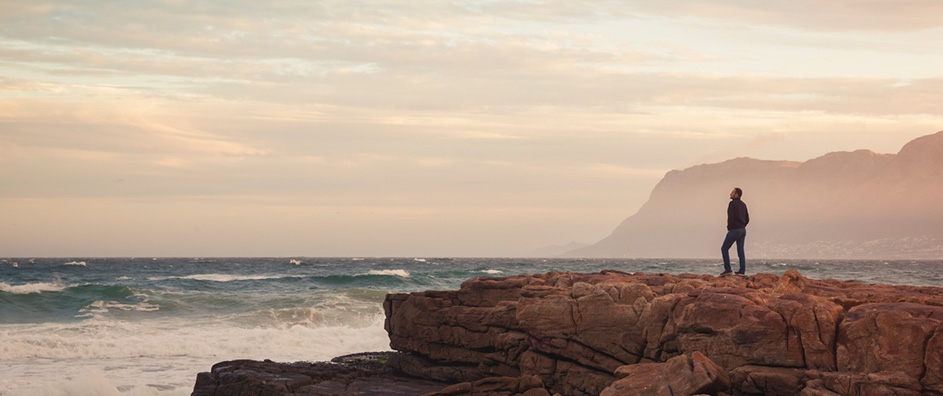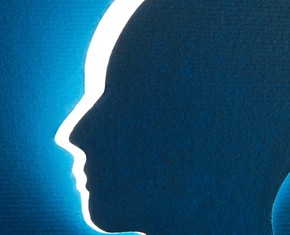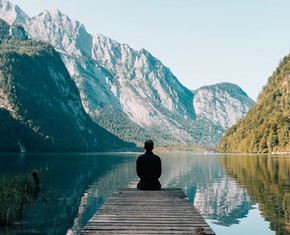The views expressed in our content reflect individual perspectives and do not represent the authoritative views of the Baha'i Faith.
When death comes, will you be ready?
Were I finished with the process of living, then it seems I would be ready, willing, and able to welcome that silly old Grim Reaper when he knocks at my door in the middle of the night or some afternoon while I am reading in my easy chair. “Come on in, Bro! Gimme five!” I would say. He would respond, “Gimme twenty, Johnny Bump—toes, fingers, the lot!”
The point is that I think I have figured out what bothers me, and it’s not the usual sort of fear. I don’t believe in hell, other than as a spiritual or mental sense of remoteness. I don’t really fear punishment or retribution, because I really do believe that so long as I desire it and strive for it, God will forgive me my foibles and assist me in overcoming them, if not here, then in a more refined environment:
…praise be to God, the world of existence does not culminate here. If this were so, existence itself would be sterile. There are many worlds of light. For even as the plant imagines life ends with itself and has no knowledge of our existence, so the materially-minded man has no knowledge of other worlds of consciousness.
But some there are who have found divine intelligence and have obtained spiritual understanding. They have the real sight. They know of the other worlds. That is why the prophets of God forfeited this world, renounced everything material and gave their hearts to the heavenly world. Were there nothing after death, Christ would not have accepted the cross; the prophets of all time would not have sacrificed their lives. They were in touch with the celestial world and they overlooked this transitory life. This is the fruit of the tree of creation – to be freed from the darkness of the planet in order to enter the worlds of light. This is the object of existence; this is the fruit of the tree of humanity. – Abdu’l-Baha, Divine Philosophy, p. 123.
Or to put it another way, I have no doubt that whatever I will endure after this earthly period of gestation, that experience will have as its sole objective my further benefit and development. Certainly I do fear non-existence. I have done enough research and had enough convincing empirical evidence that my consciousness, my “essential self,” is not dependent on its connection with physical mechanisms for its continuation after its dissociation from what remains of my mortal frame when the time comes. The death of my father taught me that.
When Dad lay dying in a blank and pale green cubicle that hospital rooms seem decreed to be, he had a look about him different from any I’d ever seen on his face before. We would be talking about whatever came to his mind: The story about his father irately scolding his statuesque wife when grandmother Jeanie invited the ladies’ bible study class over during hog killing time; the story about grandfather riding on the back of a stallion behind his father (who had fought in some of the bloodiest battles of the Civil War) as they trotted to a clan meeting in the earliest days of reconstruction in Arno, Tennessee.
Then in mid-story his visage screwed up into concentric wrinkles of anguish so intense that his entire countenance became an emblem of sorrow like the Greek masks of tragedy. It wasn’t physical pain that carved this expression into that countenance. He knew he was dying, whereas Bill, Mom and I had naively acceded to the false hopes with which the doctors and nurses daily plied us, probably to ease their own burden, not ours.
Later, I would look back in anger at their denials about the gravity of his speech, mocking the wisdom and courage with which he summoned us together that night just in time to bid us farewell before the cancer attacked the meninges of his brain and, like the flicking of a switch, robbed him of lucidity and the pure will that such a moment required.
He strained to gain control as Mom and Bill and I sat on the edge of his bed, not really expecting any weighty pronouncements. We had been coming in shifts so that he was never without one of us. But this night he had explicitly requested that all of us be there. I think it was the first thing he had commanded in his role as titular patriarch—all else had been meek requests to have his legs rubbed or for help to the bathroom to brush his teeth.
He lay there, propped up, looking at the three of us one at a time—mother by his right shoulder, me sitting on the end of the bed and Bill standing at Dad’s left shoulder. He opened his mouth, his face calm, and nothing came out but air. Then his face suddenly contorted into that look of grief as he tried his best to speak. Words emerged, but in a weak and reedy, almost childlike whisper. “It’s just that… I don’t want to leave you.”
It was the last thing we expected. We had presumed that he, like us, had fallen prey to the foxfire of hope that had been perpetrated on us, that the occasional moments of delusion were psychological reactions, when the simple fact was the man knew he was losing it, that his control of his conscious mind was quickly fading, that his ability to determine his own thoughts could be measured in minutes.
He said nothing more, nor could we. We melted as one in hugs and tears and wrenching sobs. We tried to console him, to tell him there was hope, because we believed it. He had responded so well to chemo for two years, and he still looked great at seventy-six. He still looked distinguished, handsome, dignified, refined in his silk pajamas. He did not look like an old man, a sick man, certainly not a dying man.
But he knew the truth, and had he not called us together that night, there would never have occurred another opportunity to bid us farewell. He would have occasional moments of lucidity afterward, but very few. There was no more need to guess what his meandering words meant, what deep secret pain or longing or guilt lay hidden in the recesses of his well-lived life.
Our family doctor, E. Van Buren, Dad’s aging Sigma Chi fraternity brother from his days at Emory, knew well the truth and he told it to us simply and plainly, as a friend or brother should do. The cancer had entered the brain and nothing could stop it—no sudden regimen of high powered vitamins or herbs from the Orient.
My father had lived “the good life.” Now the physical phase of it was over.
You May Also Like
Comments

















I think I have an advantage in my quest; having been raised in an Arab Muslim country, Jordan, for most of my formative years, I learned the eventuality of death on this earthly plane and that death really is merely the next step in an eternal journey, the likes of which we will all experience and none of us can recount. Having begun my own study, as it were, has not made resolving the myriad complexities of the eventuality any ...easier. Not for me, but for those, like your family, who (hopefully) will be gathered around my bed somewhere, waiting. How can I assuage their angst? Should I?
These are tough questions. They're not easily answered.